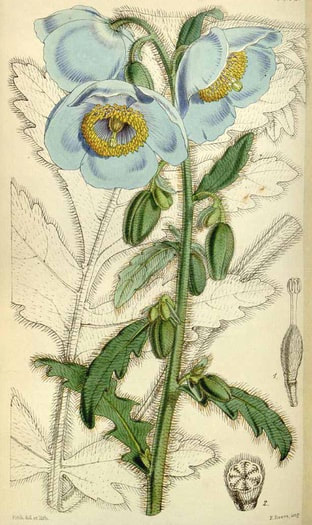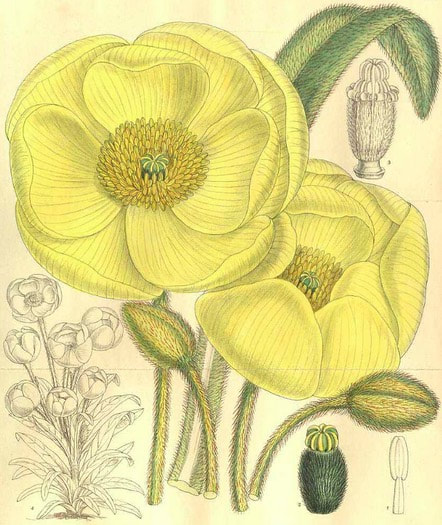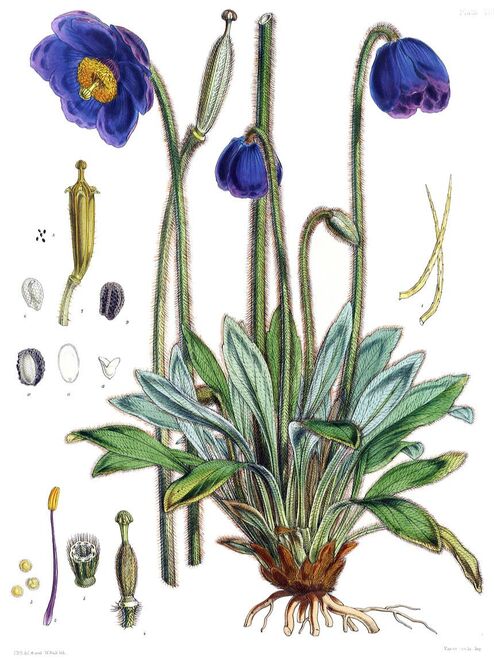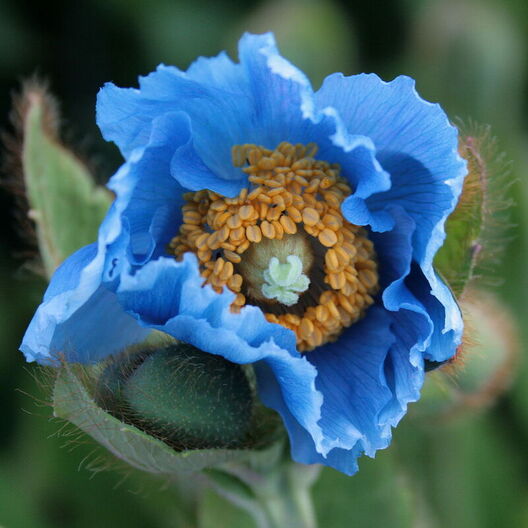Sentry Page Protection
Meconopsis, Ut pal ཨུཏ་པལ
Blue Poppy
Ut Pal (Tibetan)
Lu Rong Hao (TCM)
Ut Pal (Tibetan)
Lu Rong Hao (TCM)
Meconopsis simplicifolia
(Illustrations of Himalayan Plants, Hooker, 1855)
(Illustrations of Himalayan Plants, Hooker, 1855)
Botanical name:
Meconopsis spp.
There are 4 varieties of Ut pal: based on the color of their flower:
Parts used:
Whole herb in flower; or the Flower
Temperature & Taste:
Cool, dry. Bitter
Meconopsis spp.
There are 4 varieties of Ut pal: based on the color of their flower:
- Blue: Ut pal sngon po, ཨུཏ་པལ་སྔོན་པོ Meconopsis torquata, M. grandis, M. quintuplinervia
- Red: Ut pal dmar po, ཨུཏ་པལ་དམར་པོ Meconopsis punicea
- White: Ut pal dkar po ཨུཏ་པལ་དཀར་པོ Meconopsis spp.
- Yellow: Ut pal ser po ཨུཏ་པལ་སེར་པོ Meconopsis integrifolia, M. paniculata (syn. M. wallichi)
Parts used:
Whole herb in flower; or the Flower
Temperature & Taste:
Cool, dry. Bitter
Uses:
1. Clears Heat and Toxin:
-Fever; Fever of Infectious diseases; Chronic Fever
-Blood disorders from Heat and Toxin
-Gastroenteritis
-auxiliary medicine in some Tumors and Cancers
2. Clears Lung Heat, Stops Cough:
-Fever of the Lung or Liver
-acute Sore Throat
-Tuberculosis, Pneumonia
3. Clears Heat and Damp:
-Edema from Heat
-Leukorrhea
4. Clears Liver Heat:
-Hepatitis
-Fever from Liver Heat
-Headache, Hypertension
-has a sedative effect
Dose:
Powder: 1–3 grams
Comment:
1. Meconopsis species are very varied and hybridise readily. It is now believed some species may be varieties rather than distinct species.
2. Other species of Meconopsis used in Tibetan Medicine (with different functions) include M. horridula (Tsher Sngon) and M. racemosa (A Byag Tsher Sngon)
3. Meconopsis should not be confused with Water Lily which is known as Utpala in Ayurveda.
Substitutes:
1. Red Poppy has been suggested as a suitable substitute. (Gyatso)
2. Flowers of Scabiosa comosa have been used by Tibetans in Russia
3. Water Lily may be a suitable substitute in some cases. The name Ut Pal is said to be derived from the Ayurvedic Utpala which refers to Water Lily.
Powder: 1–3 grams
Comment:
1. Meconopsis species are very varied and hybridise readily. It is now believed some species may be varieties rather than distinct species.
2. Other species of Meconopsis used in Tibetan Medicine (with different functions) include M. horridula (Tsher Sngon) and M. racemosa (A Byag Tsher Sngon)
3. Meconopsis should not be confused with Water Lily which is known as Utpala in Ayurveda.
Substitutes:
1. Red Poppy has been suggested as a suitable substitute. (Gyatso)
2. Flowers of Scabiosa comosa have been used by Tibetans in Russia
3. Water Lily may be a suitable substitute in some cases. The name Ut Pal is said to be derived from the Ayurvedic Utpala which refers to Water Lily.
Main Combinations:
1. Lung Heat Cough:
i. and Asthma, Meconopsis with Tabasheer, Clove, Safflower, Pomegranate, Cinnamon, Raisin, Licorice (as in Tabasheer 9)
ii. with Hemoptysis, Meconopsis with Sandalwood, Tabasheer, Clove, Safflower, Raisin, Licorice (as in Sandalwood 8)
2. Liver Heat, Meconopsis with Bezoar, Shilajit, Safflower, Aristolchia, Swertia, Costus
3. High Fever with Delirium, Meningitis, Malaria, Meconopsis with Camphor, Clove, Tabasheer, Safflower, White Sandalwood, Rhinoceros horn (Water Buffalo horn), Aloeswood, Swertia (as in Camphor 14)
4. As a sedative, Nutmeg, Meconopsis, Indian Spikenard. This can be used for people coming off sleeping pills or anti-depressants..
5. Brain Cancer, Meconopsis with Semiaquilegia Tian Kui Zi, Ligusticum Chuan Xiong, Saffron, Pearl (Practical Anti-cancer Prescriptions)
Major Formulas:
Aloeswood 31 (Tibetan)
Aloeswood 35 (Tibetan)
Bezoar 9 (Gi wan 9) (Tibetan)
Camphor 14 (Tibetan)
Camphor 25 (Tibetan)
Conqueror of Brown Phlegm (Smug po gyul rgyal).
Crystal Moon 37 (Zla shel so bdun) (Tibetan)
Death Healing Nectar (Tibetan)
Emblic 25 (Skyu ru nyer lnga) (Tibetan)
Mild Medicine (Tibetan)
Nux Vomica 13 (Ko byi bcu gsum) (Tibetan)
Rolled Turquoise 13 (Gyu dril 13) (Tibetan)
Safflower Supreme 7 (Gur gum mchog bdun) (Tibetan)
Sandalwood 8 (Tsan dan brgyad pa) (Tibetan)
Tabasheer 7 (Cu gang bde byed) (Tibetan)
Tabasheer 9 (Tibetan)
Cautions:
None noted
Main Preparations used:
None noted
Main Preparations used:
Research:
1. An Ethnopharmacological, Phytochemical and Pharmacological Review of the Genus Meconopsis.
2. Antinociceptive and anti-tussive activities of the ethanol extract of the flowers of Meconopsis punicea Maxim.
3. In vitro and in vivo hepatoprotective and antioxidant activity of ethanolic extract from Meconopsis integrifolia (Maxim.) Franch.
4. Great genetic differentiation among populations of Meconopsis integrifolia and its implication for plant speciation in the Qinghai-Tibetan Plateau.
5. Anti-Cancer effects of Meconopsis
2. Antinociceptive and anti-tussive activities of the ethanol extract of the flowers of Meconopsis punicea Maxim.
3. In vitro and in vivo hepatoprotective and antioxidant activity of ethanolic extract from Meconopsis integrifolia (Maxim.) Franch.
4. Great genetic differentiation among populations of Meconopsis integrifolia and its implication for plant speciation in the Qinghai-Tibetan Plateau.
5. Anti-Cancer effects of Meconopsis





